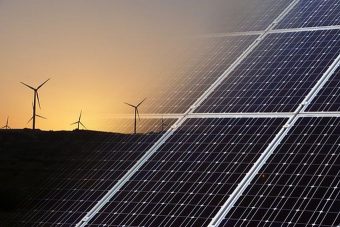
The National Democratic Alliance (NDA) government’s aggressive renewable energy push that aims to ramp up the share of green power in the country’s electricity supply mix from the current seven per cent to nearly 20 per cent by 2022, is getting stonewalled across a number of states.
State-owned power distribution utilities (discoms) in states such as Rajasthan and Tamil Nadu are reported to be curtailing solar and wind power generation, as well as randomly issuing backing down instructions — asking generators to unplug from the grid. Discoms in Tamil Nadu, Madhya Pradesh, Maharashtra and Rajasthan are also reported to be delaying payments to generators of wind and solar power by 6-12 months, putting the cash flows of most of the smaller renewable firms under severe stress.
The results are showing up in the form of mounting number of petitions before the central and state power regulators. In the last 24 months, there were at least 19 petitions by more than half a dozen players — including ReNew Wind Energy, CLP Wind Farms, Orange DND Wind Power, Ostro Renewables, Clean Wind Power (Devgarh), Mytrah Vayu, Tanot Wind Power — alleging that states such as Rajasthan are frequently backing down renewable energy generation on a frequent basis during the peak season citing grid security as the reasons, resulting in generation losses of upwards of Rs 100 crore for these firms on a cumulative basis. “The situation of state utilities forcing solar and wind units to back down continues to date,” an executive of one of the affected companies told The Indian Express.
The Central Electricity Regulatory Commission (CERC), while acknowledging the loss of generation for solar and wind players due to grid unavailability or back-down instructions, has now stepped in to mandate that utilities should issue written explanations in the case of back-down instructions that have been issued to renewable players due to issues other than grid security and reliability. The central regulator has directed the National Load Despatch Centre (NLDC), the apex body entrusted with ensuring integrated operation of the national power system, to work with the State Load Despatch Centres (SLDC) to evolve such a framework.
The list of 19 petitions filed by wind power firms against the state-owned discoms of Rajasthan allege that the backing down instructions issued by the discoms are “arbitrary” and in violation of the Rajasthan Electricity Regulatory Commission’s Grid Code and the RE Tariff Regulations.
The story unfolding in Tamil Nadu is almost identical, forcing the Delhi-based National Solar Energy Federation of India to move the state regulator Tamil Nadu Electricity Regulatory Commission in September against the state utilities for curtailing solar power generation and issuing backing down instructions. The companies involved in the petition — Kamuthi Renewable Energy Ltd, Ramnad Solar Power Ltd and Adani Green Energy (Tamil Nadu) Ltd — stated that most of these instructions are issued telephonically by the Tamil Nadu Generation and Distribution Corporation (TANGEDCO) and Tamil Nadu Transmission Corporation (TANTRANSCO) without any written confirmation either prior to or after backing down or disconnection, leading to question marks of the financial viability of the units in question. Industry players contend that the trend would inevitably lead to a drop in interest of investors in the coming months.
The move by states to stymie renewable generation is at cross-purposes with the larger objective of pushing green power. A Union power ministry official admitted to the problem in a “handful of states” and said the Central government is working with states on the resolution of the payment of arrears to renewable energy companies. “Not more than a couple of discoms have been delaying payments. We are working with them to resolve the issue,” the official said.
There are, however, limitations to the extent to which an intervention can be made in such cases. The tariff regulations, the power purchase agreements (PPA) as well as the Grid Codes … all of them state in unambiguous terms that energy from renewable sources shall not be subject to merit order dispatch, which means that it will not be asked to back down for commercial considerations and that they be treated as ‘must-run’ by the buying discom as well as the state load dispatch centre. The PPAs mention that the buyer shall take delivery of all the renewable energy supplied by the producer unless there are technical constraints in the grid. “However, there is an over-riding clause in the grid code that the grid operator can ask any generator to back down in real time in the interest of grid security or transmission constraint, for which verbal instructions suffice. It is being alleged by the solar and wind generators that without formally asking for backing down, the discoms are firing from the shoulder of the state load despatch centres,” an industry expert said. The SLDCs are then repeatedly issuing oral backing down instructions without even verbally explaining the reason, amid allegations that they are misusing their authority. The state regulatory commissions too seem to be dragging their feet on the issue, as evident from the fact that petition of Rajasthan wind generators has been pending for almost an year and the mounting numbers of similar petitions being filed across different states.
All of this come at a time when capacity addition in the renewable energy sector has shown its strongest performance in 2016-17, with a record capacity addition of 11,320 MW that eclipsed the thermal power segment’s 11,551 MW during the fiscal. As of March 31, the total grid-connected renewable power capacity in the country stood at 57,260 MW (close to 20 per cent of India’s overall installed capacity of 3,29,000 MW). Based on the current capacity addition targets, India is forecast to meet 19 per cent of its power demand from renewable energy sources in five years, by fiscal year 2022. Commissioned projects being asked to back down is bad news for new projects.
Source: indianexpress.com



